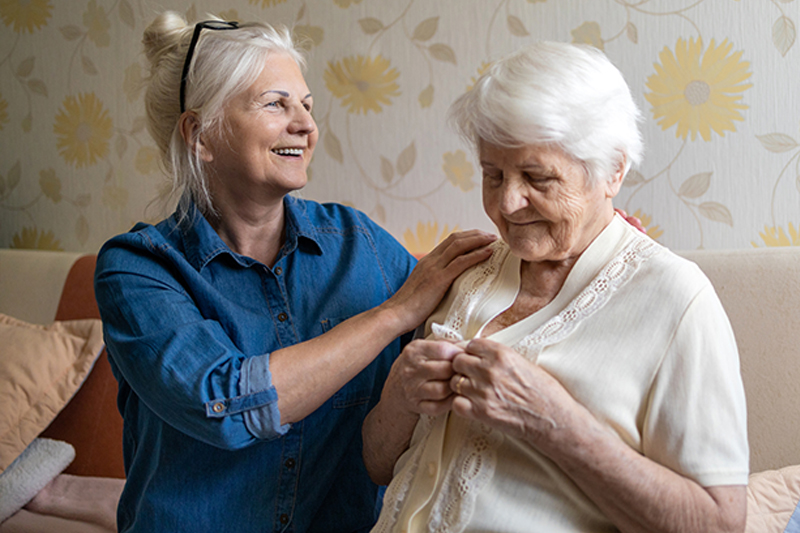
Learn what to expect during the middle stages of Alzheimer’s.
Getting the news that an older family member has been diagnosed with Alzheimer’s is life-altering. Thinking through the many different factors and facets associated with the disease as well as its effects, both at present and in the future, can be overwhelming.
In this three-part series, we will examine the early, middle and later stages of dementia. We provide an overview of the type of care needed during each stage, what family caregivers can expect, and how a professional Baltimore caregiver from Absolute Companion Care can help.
Middle Stages of Alzheimer’s Caregiving
The change from the early stages to middle stages of Alzheimer’s takes place slowly, and can even be unnoticeable at first. Eventually, a senior loved one in this stage will begin to encounter increasing difficulty with everyday tasks, such as getting dressed. It’s essential for family caregivers to continue to encourage a feeling of autonomy, allowing the senior to do these tasks at his/her own pace for as long as possible (and as long as it is safe to do so). This involves flexibility, patience, and adaptability.
It will become essential to invest additional time in providing care, and also to establish creative techniques and approaches to decrease frustration – for your senior loved one as well as yourself. Self-care becomes vitally important in the middle stage of dementia to help caregivers manage stress.
Here’s what you might expect to experience in this stage:
Behavior Changes
- Anxiety
- Impatience
- Depression
- Repetitive behaviors
- Aggressive outbursts (verbal and/or physical)
How You Can Help
Keeping a calm attitude is important. Never disagree or try to reason with an individual in the middle stage of dementia. In a soothing and calm tone, recognize the feeling behind the behavior and provide suggestions to help. For example: “Grandma, I can see you’re feeling angry about misplacing your favorite shirt. It is most likely in the washing machine. This pink one looks fabulous on you; would you like to wear it today?”
Be aware that the words and actions being used are not a reflection of you personally, but merely part of the normal development of dementia. Many times, there is an underlying emotion, such as exhaustion, fear, or hunger, driving the behavior. Try to pinpoint the root cause and tackle that.
Communication Changes
- Losing train of thought
- Forgetting a word
- Repeating statements or questions
- Using more non-verbal communication
How You Can Help
Accept whatever kind of communication works well for the individual, without trying to correct her or him. Adjust your communication technique to make it simpler and easier for the person to understand and respond to you. For instance, instead of asking open-ended questions (“What would you like for dinner today?”) offer a choice between just two choices (“Would you like salmon or chicken for dinner today?”). Speak in a clear, soothing tone, and allow the senior sufficient time to reply without jumping in and providing the answer yourself.
Safety-Related Changes
- Wandering
- Driving concerns
- Sundowning
In this stage of the disease, paying closer attention to safety issues becomes very important. Driving should cease – something that’s often problematic for seniors to accept. If possible, include the senior in making this decision. If not, a note from the doctor prohibiting driving is usually the most effective way to gain his or her consent. If the senior is insistent about continuing to drive, you might need to take away the keys, or replace his/her set of keys with nonworking ones.
Additionally, sundowning and wandering often become alarming and challenging for family caregivers to manage independently. Partnering with a trusted care provider with experience in dementia care, like Absolute Companion Care, is a great solution. Our caregivers can take the night shift, making certain older adults are safe and distracted with enjoyable activities when unable to sleep – allowing family caregivers to get the rest they require.
For more information about how a specially-trained Baltimore caregiver can help with customized dementia care, contact us any time at 410-357-9640. To see all of the communities where we provide care, please visit our Service Area page.
